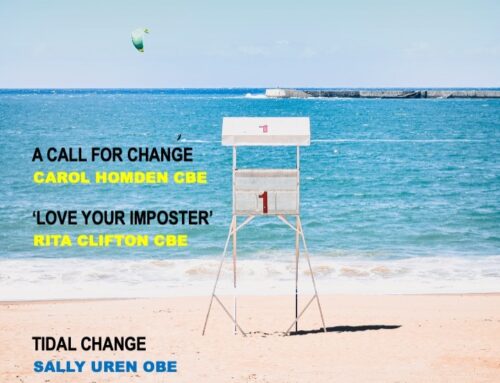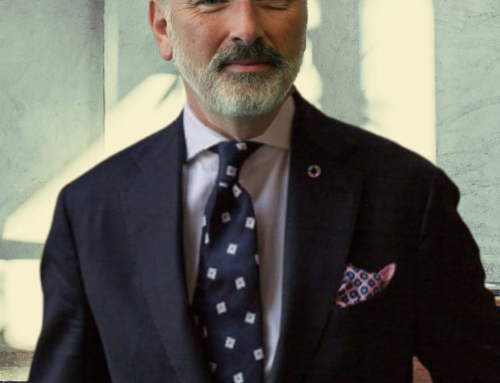It Pays to be Kind in Business

I’ve been thinking back to the business world I got to know in the 80s and the 90s. It was a time when having a “corporate culture” really became big, shareholder value reigned supreme and kindness is easily the last word most people would have associated with business leadership or success at that point.
The atrocities of corporate culture from back then are now part of our cultural archive too – from Gordon Gekko’s infamous “lunch is for wimps” in Wall Street, to the rampant sexism in Working Girl and 9 to 5. But just because we acknowledged these wrongs when we went down the Odeon, it doesn’t mean we addressed them in our lives.
There’s still an awful lot more space for kindness in economics and business.
Every day, we hear new stories showing those who are not kind will be the losers of this moment in history. Just this month, the reports of £3.50 an hour wages and allegations of modern slavery at a factory that Boohoo use in Leicester have rightly resulted in stockists refusing to stock their clothes and the markets have shown leadership and sent the company’s stocks into nosedive – both financially and reputationally. Boohoo’s stocks tumbled 30%, wiping $1.25 billion off its market value. No one in their right mind would shed a tear for Boohoo but we have to ask ourselves as a society – how did we let corporate greed and unconscious consumerism get so far?
We are hovering over the reset button in the wake of the global pandemic – now more than ever, we need to champion the ideas and values that will let us press it.
A decade ago, the World Happiness Report launched and included measurements for business and economics. Bhutan even adopted gross national happiness in place of GDP – how great is that? It’s been proven that companies who are more diverse perform better according to research from McKinsey & Co, we know now from Axioma’s study that companies who invest in ESG perform better, and since the last global financial crash there has been a drive towards more socially conscious business principles – a wider understanding that profit comes from purpose.
But when did kindness explicitly last appear on a boardroom agenda? When did kindness in business receive the same amount of respect and attention? We need to rethink the old indices we use to judge and base decisions on for this new decade – and ensure kindness is firmly embedded in these as a key metric.
The economic fallout of COVID-19 is already set to be so much greater than any recession of the past century. The Office for Budget Responsibility has suggested unemployment could rise to 12% by the end of this year – the average rate in 2019 was 3.8%.
It’s a terrifying prospect, but it does not need to become reality. While the role of government at this time has been to protect businesses and their employees; as economic measures ease, the furlough scheme is ended and the burden of responsibility falls back onto businesses themselves, employers must weigh up costs: the costs they save by cutting people, pay and benefits versus the cost these decisions could have on their staff’s livelihoods, and on their own reputations.
For those that can afford to be kind – and I do acknowledge that some SME’s may need to make difficult decisions to survive in order to rebuild – surely there is long term reputational value in kindness rather than the drive to maintain profit at the expense of looking after the people that helped create those profit levels.
We need to set a precedent that kindness in its myriad forms – towards employees, towards other businesses, towards people, towards the environment – will pay its own dividends. We need to cultivate a business landscape where all acts, from the small to the grand gestures, will have a real impact on share price and investment, corporate culture, and recruitment of talent.
It’s clear from the backlash against companies who did not immediately act to protect the welfare of their employees in the early days of this crisis – whether it was by compelling them to continue working up until the point of government-enforced lockdown, or opting for redundancies over the furlough scheme – that the public cares about how businesses act. Just look at how Wetherspoon’s handling of its employees’ pay during lockdown has sparked calls for a boycott of the chain in the shape of an app justly called ‘Neverspoons.’
Those same expectations still remain, immovable as mountains. The uncaring may save money in the short-term but looking ahead it is the kind who will sustain. They will be the ones who attract positive coverage, customers, prospective employees, and investors in the long-term.
Accenture research in 2018 found that 63% of consumers prefer to purchase goods and services from businesses that reflect their values. An almost identical number want companies to take social, cultural, environmental and political stances, and nearly half stopped using a business that they felt had disappointed them in terms of their social values.
We have seen this play out most prominently over the past few months in the response to the resurgent Black Lives Matter movement, following the murder of George Floyd.
In the US, workers at stores including Whole Foods and Chick-fil-A pushed back after being told they could not wear Black Lives Matter masks or shirts to work – only for management to double down on their decision, despite public backlash and supposed support for the movement in its public statements. Others however, such as Taco Bell and Starbucks, learnt from the experience and reversed their decisions to ban pro-Black Lives Matter shirts and pins – the latter, after the event, backtracking and creating a shirt for their employees “to demonstrate allyship” with the movement.
In the UK, Yorkshire Tea gained an infamous reputational boost after telling a Twitter user who praised the company’s slow response to the Black Lives Matter protests, to not buy its tea again. While to be truly meaningful in the case of Black Lives Matter, these acts have to be more than statements, it demonstrates that taking a stance may be divisive – but puts a business on the right side of history.
Kindness is not a choice – it is a business imperative. There need to be real consequences for those who exploit and take advantage of people, and rewards for those who act with a conscience. By showing empathy and humanity, business can lead the way into a kinder future for all – and prosper.
By Wayne Hemingway, Creative Director of The Good Business Festival and partner at HemingwayDesign
Wayne Hemingway MBE
Creative Director, The Good Business Festival
Partner, HemingwayDesign
https://thegoodbusinessfestival.com/
Twitter: @goodbizfest
http://www.hemingwaydesign.co.uk

It Pays to be Kind in Business

I’ve been thinking back to the business world I got to know in the 80s and the 90s. It was a time when having a “corporate culture” really became big, shareholder value reigned supreme and kindness is easily the last word most people would have associated with business leadership or success at that point.
The atrocities of corporate culture from back then are now part of our cultural archive too – from Gordon Gekko’s infamous “lunch is for wimps” in Wall Street, to the rampant sexism in Working Girl and 9 to 5. But just because we acknowledged these wrongs when we went down the Odeon, it doesn’t mean we addressed them in our lives.
There’s still an awful lot more space for kindness in economics and business.
Every day, we hear new stories showing those who are not kind will be the losers of this moment in history. Just this month, the reports of £3.50 an hour wages and allegations of modern slavery at a factory that Boohoo use in Leicester have rightly resulted in stockists refusing to stock their clothes and the markets have shown leadership and sent the company’s stocks into nosedive – both financially and reputationally. Boohoo’s stocks tumbled 30%, wiping $1.25 billion off its market value. No one in their right mind would shed a tear for Boohoo but we have to ask ourselves as a society – how did we let corporate greed and unconscious consumerism get so far?
We are hovering over the reset button in the wake of the global pandemic – now more than ever, we need to champion the ideas and values that will let us press it.
A decade ago, the World Happiness Report launched and included measurements for business and economics. Bhutan even adopted gross national happiness in place of GDP – how great is that? It’s been proven that companies who are more diverse perform better according to research from McKinsey & Co, we know now from Axioma’s study that companies who invest in ESG perform better, and since the last global financial crash there has been a drive towards more socially conscious business principles – a wider understanding that profit comes from purpose.
But when did kindness explicitly last appear on a boardroom agenda? When did kindness in business receive the same amount of respect and attention? We need to rethink the old indices we use to judge and base decisions on for this new decade – and ensure kindness is firmly embedded in these as a key metric.
The economic fallout of COVID-19 is already set to be so much greater than any recession of the past century. The Office for Budget Responsibility has suggested unemployment could rise to 12% by the end of this year – the average rate in 2019 was 3.8%.
It’s a terrifying prospect, but it does not need to become reality. While the role of government at this time has been to protect businesses and their employees; as economic measures ease, the furlough scheme is ended and the burden of responsibility falls back onto businesses themselves, employers must weigh up costs: the costs they save by cutting people, pay and benefits versus the cost these decisions could have on their staff’s livelihoods, and on their own reputations.
For those that can afford to be kind – and I do acknowledge that some SME’s may need to make difficult decisions to survive in order to rebuild – surely there is long term reputational value in kindness rather than the drive to maintain profit at the expense of looking after the people that helped create those profit levels.
We need to set a precedent that kindness in its myriad forms – towards employees, towards other businesses, towards people, towards the environment – will pay its own dividends. We need to cultivate a business landscape where all acts, from the small to the grand gestures, will have a real impact on share price and investment, corporate culture, and recruitment of talent.
It’s clear from the backlash against companies who did not immediately act to protect the welfare of their employees in the early days of this crisis – whether it was by compelling them to continue working up until the point of government-enforced lockdown, or opting for redundancies over the furlough scheme – that the public cares about how businesses act. Just look at how Wetherspoon’s handling of its employees’ pay during lockdown has sparked calls for a boycott of the chain in the shape of an app justly called ‘Neverspoons.’
Those same expectations still remain, immovable as mountains. The uncaring may save money in the short-term but looking ahead it is the kind who will sustain. They will be the ones who attract positive coverage, customers, prospective employees, and investors in the long-term.
Accenture research in 2018 found that 63% of consumers prefer to purchase goods and services from businesses that reflect their values. An almost identical number want companies to take social, cultural, environmental and political stances, and nearly half stopped using a business that they felt had disappointed them in terms of their social values.
We have seen this play out most prominently over the past few months in the response to the resurgent Black Lives Matter movement, following the murder of George Floyd.
In the US, workers at stores including Whole Foods and Chick-fil-A pushed back after being told they could not wear Black Lives Matter masks or shirts to work – only for management to double down on their decision, despite public backlash and supposed support for the movement in its public statements. Others however, such as Taco Bell and Starbucks, learnt from the experience and reversed their decisions to ban pro-Black Lives Matter shirts and pins – the latter, after the event, backtracking and creating a shirt for their employees “to demonstrate allyship” with the movement.
In the UK, Yorkshire Tea gained an infamous reputational boost after telling a Twitter user who praised the company’s slow response to the Black Lives Matter protests, to not buy its tea again. While to be truly meaningful in the case of Black Lives Matter, these acts have to be more than statements, it demonstrates that taking a stance may be divisive – but puts a business on the right side of history.
Kindness is not a choice – it is a business imperative. There need to be real consequences for those who exploit and take advantage of people, and rewards for those who act with a conscience. By showing empathy and humanity, business can lead the way into a kinder future for all – and prosper.
By Wayne Hemingway, Creative Director of The Good Business Festival and partner at HemingwayDesign
Wayne Hemingway MBE
Creative Director, The Good Business Festival
Partner, HemingwayDesign
https://thegoodbusinessfestival.com/
Twitter: @goodbizfest
http://www.hemingwaydesign.co.uk




